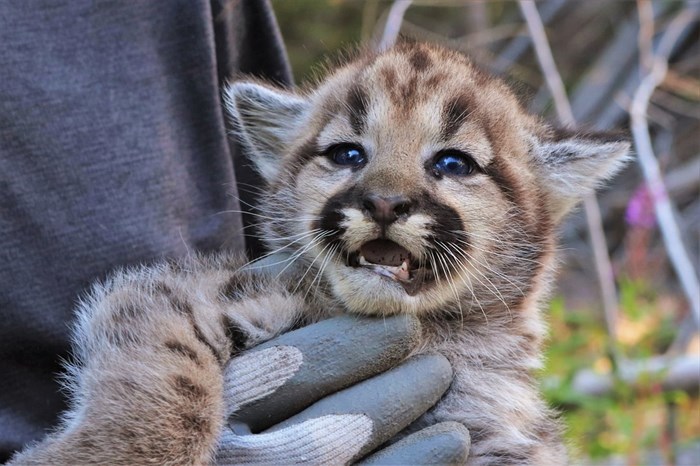
A cougar kitten found as part of the Southern B.C. Cougar Project.
Image Credit: Southern B.C. Cougar Project
January 02, 2021 - 10:35 AM
A UBC Okanagan researcher noticed that while tracking cougars in Southern B.C., cougars and residents appeared to be in closer proximity to one-another as B.C. Parks were closed due to the pandemic.
Siobhan Darlington is a PhD student and coordinator of the Southern B.C. Cougar Project which has been tracking roughly 20 wildcats using collars and satellites.
The project began in Dec. 2019 and is collecting data on cougar densities, territory size, dispersal, and survival, measuring their pressure on mule deer and other prey, examining the role of disturbances on the big cats (e.g. wildfire, forestry) and hunter harvest on cougar habitat use and examining the diversity and interactions of scavenging communities at cougar kill sites.

Researchers tracking cougars as part of the Southern B.C. Cougar Project.
Image Credit: Southern B.C. Cougar Project
"Interestingly, the pandemic did not appear to shift cougar behaviour with the reduction of human activity in towns and the outdoors. The only cougars that came closer to towns during the pandemic were juveniles on dispersal," Darlington wrote in the project's latest update, published in November.
"This is normal for cougars because they are trying to find a new territory to establish when they leave their mothers. I did notice that the backcountry was filled with campers, and people were coming closer to our resident cougars because provincial parks were closed. We won’t know the true impact of the pandemic on cougar behaviour and human-cougar interactions until we have collected several more years of data," she wrote.
READ MORE: Cougars and mule deer have a tight relationship, UBC Okanagan researcher says
While tracking the cougars, researchers were extra careful as cougars can contract COVID-19 so mask use was mandatory while handling them and in other spaces where social distancing wasn't possible, she wrote.
Since the project's beginning, the researchers have visited 415 cluster sites, places the cougars frequently visit.
"I have noticed that the cougars are killing more bucks in the fall than in the springtime, likely because male mule deer come down from higher elevations to mate," she wrote.
The cougars have also been killing more animals in the summer, and sometimes carcasses were left with only their organs eaten.
"Black bears scavenged almost every kill that we monitored and so did coyotes, turkey vultures, and ravens. Maggots take over the carcass in the summer heat very quickly, so the cougars don’t stay as long on a kill compared to the winter because the meat doesn’t last," Darlington wrote.
Roughly 100 mule deer are also wearing tracking collars as part of the Southern Interior Mule Deer Project, an ongoing study to understand the drastic decline in mule deer populations.
“We know cougars are the main predator for the mule deer and we have to figure out why. It kind of varies by area, in the Boundary Country (the region between the Okanagan and Kootenays) a lot more mule deer die from cougars than in the west Okanagan and we don’t know if there are more cougars, or is it the habitat that makes it easier for the cougars to get the deer,” UBCO professor Adam Ford, said in a previous interview with iNFOnews.
One theory, supported by anecdotal evidence, is that cougars are an ambush hunter and they will do well in habitats that have cover or rocky topography to hide before they pounce on their prey, Ford said.
The researchers are also monitoring newborn kittens, via cameras which have been set up at den sites, to determine their rate of survival and on their health.
The project is a collaboration between UBCO and the Ministry of Forests, Lands, Natural Resources Operations and Rural Development.
To contact a reporter for this story, email Carli Berry or call 250-864-7494 or email the editor. You can also submit photos, videos or news tips to the newsroom and be entered to win a monthly prize draw.
We welcome your comments and opinions on our stories but play nice. We won't censor or delete comments unless they contain off-topic statements or links, unnecessary vulgarity, false facts, spam or obviously fake profiles. If you have any concerns about what you see in comments, email the editor in the link above.
News from © iNFOnews, 2021